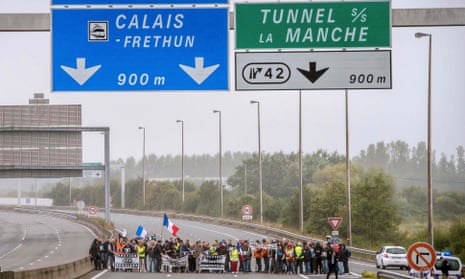Work is about to begin on “a big, new wall” in Calais as the latest attempt to prevent refugees and migrants jumping aboard lorries heading for the Channel port, the UK’s immigration minister has confirmed.
Robert Goodwill told MPs on Tuesday that the four-metre high wall was part of a £17m package of joint Anglo-French security measures to tighten precautions at the port.
“People are still getting through,” he said. “We have done the fences. Now we are doing the wall,” the new immigration minister told the Commons home affairs committee.
Building on the 1km-long wall along the ferry port’s main dual-carriageway approach road, known as the Rocade, is due to start this month. The £1.9m wall will be built in two sections on either side of the road to protect lorries and other vehicles from migrants who have used rocks, shopping trolleys and even tree trunks to try to stop vehicles before climbing aboard.
It will be made of smooth concrete in an attempt to make it more difficult to scale, with plants and flowers on one side to reduce its visual impact on the local area. It is due to be completed by the end of the year.

The plan has already attracted criticism from local residents who have started calling it “the great wall of Calais”.
François Guennoc of Auberge des Migrants, a French aid group working in Calais, said: “This wall is the latest extension to kilometres of fencing and security surveillance already in place. It will just result in people going further to get round it.
“When you put walls up anywhere in the world, people find ways to go round them. It’s a waste of money. It could make it more dangerous for people, it will push up tariffs for people smugglers and people will end up taking more risks.”

The Road Haulage Association has said it will be a poor use of taxpayers’ money, arguing that security levels need to be improved in the surrounding approach roads to Calais. “It is imperative that the money to pay for a wall would be much better spent on increasing security along approach roads,” a spokesman said.
But Goodwill, a former shipping minister, said the new wall was part of a package of measures to step up security at the Channel ports. “We are going to start building this big, new wall as part of the £17m package we are doing with the French. There is still more to do. We have also invested in space for 200 lorries at Calais so that they have somewhere safe to wait.”
Goodwill, who took over the job of immigration minister on 16 July, said he had yet to visit Calais to see for himself the conditions in the refugee camp known as the “Jungle”. He said he would go as soon as he could but refused to be pinned down by MPs on when exactly that might be.
He defended the government’s record on helping child refugees with links to Britain in the Calais camp, saying they were trying to speed up the process. But he conceded that he had only had one lengthy conversation with Lord Dubs, the leading parliamentary campaigner on the issue, since taking over the job.
